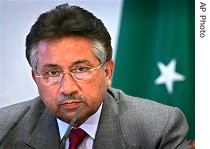2007年VOA标准英语-US Experts Detect Heightened Global Terrorist A
搜索关注在线英语听力室公众号:tingroom,领取免费英语资料大礼包。
(单词翻译)
By Greg FlakusAustin, Texas
17 July 2007
The attempted bombings in London and Glasgow last month and the release of purported2 tapes from al-Qaida's leadership this week have raised concerns about possible new terrorist attacks. But recent events in Pakistan have raised the possibility of military action in the mountainous northwest provinces where local tribesmen have provided al-Qaida and Taleban leaders with a hideout. VOA's Greg Flakus spoke3 to top analysts5 following these events at Strategic Forecasting, known as Stratfor, and filed this report from Austin, Texas.
At their headquarters in the heart of Texas, terrorism experts and political analysts keep a close eye on developments that may affect their clients, who include international businesses as well as government officials.
In the new U.S. intelligence report, al-Qaida is portrayed6 as a growing threat. The report says the terrorist organization, utilizing7 new training camps along the Afghan-Pakistan border, is stepping up efforts to get operatives into the United States to carry out attacks, perhaps on the scale of September 11, 2001. This week a new Osama bin1 Laden8 tape emerged and, although many analysts believe it was taped years ago, Stratfor's Vice9 President of Counter-Terrorism Analysis, Fred Burton, says there may be something going on.
 |
| Fred Burton |
Burton says there is no doubt al-Qaida would like to get operatives into the United States to carry out attacks, but that has become far more difficult as a result of stepped up counter-terrorism efforts.
 |
| Pervez Musharraf (file photo) |
"I think he is under a lot of pressure to do something. There is a tremendous amount of U.S. pressure on him to do something for that specific little region," he said. "My personal opinion is that, sooner or later, we will see some effort under way and it very well might be covert14 action on the part of the Pakistanis in concert with the CIA or U.S. special forces or we are going to see U.S. special forces covert action in that area."
Burton clarifies, however, that direct U.S. involvement is not likely, because it would involve an attack in another nation's territory.
Pakistani military incursions into the area in the past disturbed tribal15 groups there and led to bloody16 confrontations17 between them and the army. Since September of last year, President Musharraf has kept his forces out of the region under an agreement with local leaders. But the truce18 was broken by Taleban leaders Monday and terrorist attacks in recent days have claimed dozens of lives.
Since the prime targets of many of these attacks have been police and the military, Stratfor's South Asia analyst4 Reva Bhalla sees an increase in domestic pressure on Mr. Musharraf to act against the terrorists.
 |
| Reva Bhalla |
Bhalla says a new Pakistani campaign in the tribal regions is the last thing al-Qaida's top leadership could have wanted as it puts them on the run and reduces their capability20 to coordinate21 operations elsewhere.
"Al-Qaida is in a very tough position because, in the past, thus far they have really been taking great care that they did not have a lot of military activity in the area where they have been hiding out," she added. "For operational security reasons, you want to keep intact your core hideout and your sympathizers in that area. You do not want to alienate22 them by encouraging attacks in that region."
President Musharraf is making efforts to restore the truce with northern tribal leaders in order to calm domestic tensions, but if the violence continues, he may have little other option than to confront the tribe groups with military force.
 收听单词发音
收听单词发音 




